This UNFCCC COP 21 is -- In a word – overwhelming.
Navigating the venues is like learning your way around a small city. Dozens of events are going on simultaneously, including meetings, press conferences, films, briefings, workshops and presentations. Trying to figure out what is most interesting or most important is an incredible challenge.
I have been a believer in climate change from the first time I heard about it, and I have worked on the local level to do what I can to both prevent climate change and to mitigate its effects. I have supported and monitored the State of California leadership and initiatives related to climate change – but this event opens my eyes to a whole different world – literally.
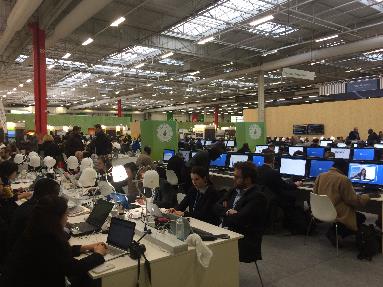
Bloggers and journalists working in the Blue Zone
This is the UNITED NATIONS. There are thousands of people here from every continent and every nation, every race and every ethnicity and language – all for one thing – slowing down and stopping climate change, and mitigating its effects.
Many stand to lose their homes, or even countries, to rising seas, and others stand to lose their livelihoods as oceans acidify, warm and lose oxygen. The oceans are perhaps the most vulnerable. This is not about warmer weather – this is about life and death. Maybe not ours – at least in the short run, but that of our grandchildren and great grandchildren. It’s also about social and environmental justice as those with the least stand to lose the most.
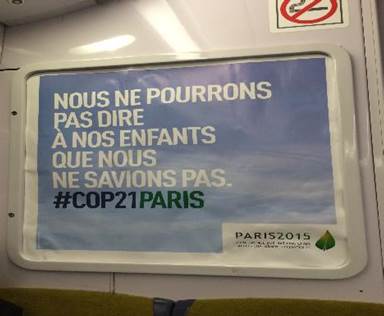
Poster on Paris commuter rail – “We can’t tell our children that we didn’t know.”
At home, we are self-absorbed in what seems important right now. We debate rent control, community benefits from the Global Campus, who will get Richmond Promise scholarships, and whether the City of Richmond is solvent, but all that is all so incredibly ephemeral compared to climate change.
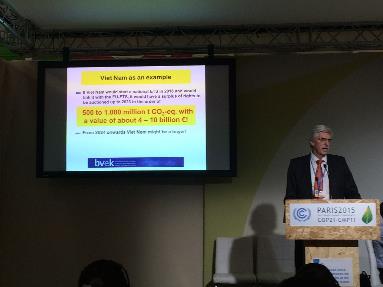
I attended several presentations on financing climate change mitigation. International carbon trade offsets seems to be a promising method.
None of our group has a vote or is participating in any negotiations, but the moral support, networking, learning and sharing we are doing seems just as important, particularly to support our president who is hobbled by a Congress of climate change deniers.
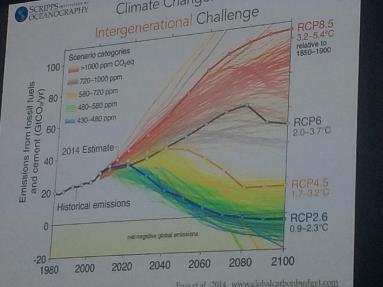
One of the debates is whether to limit temperature change to 1.5o Celsius of 2.0o Celsius. Many say 2.0o is not enough to save the oceans.
I want to share some thoughts from a couple of my colleagues, first Shawn Marshall, a former Mill Valley City Council member, former MCE board member, and now executive director of LEAN Energy:
Being at COP21 is both fascinating and exasperating because it's a huge event with agreements (and disagreements) occurring every minute in various negotiating rooms and bi-lateral meetings. That said, there is a significant US presence here, and a desire to take a leadership role in climate solutions and financing those solutions. This is the appropriate role for the United States as the second largest carbon emitter in the world. And it is distressing that the obstructionist shenanigans of a Republican Congress are allowed to be so disruptive and backwards on this issue. It's time to vote people stuck in the status quo or under the influence of coal and oil out of office! The world can't wait any longer...
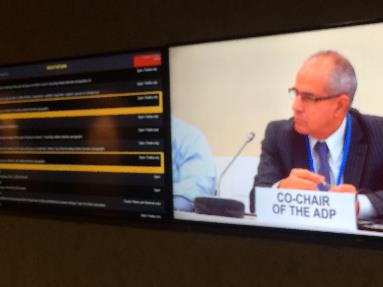
While negotiating sessions are typically closed, they are televised throughout the conference venue
Second, Dawn Weisz, executive director of MCE:
Day 4 at COP21. It is a mix of fascinating, inspiring, and, well, frustrating. Climate Negotiations between the countries are taking place but I think due to extra layers of security, observers in the Blue Zone (including me) aren't able to attend these meetings. So it's hard to keep up with the negotiations in any meaningful sense. Meanwhile, the sessions and interaction with international climate leaders has been awesome and fascinating. So much creativity and commitment in one place! A few big takeaways: 1) the current 2 degree temperature cap is NOT ENOUGH to reverse the effects of global climate change. The good news here is that there is common agreement about this; 2) international funding and compensation for climate mitigation/adaptation post 2020 is critical. As you can imagine, this is contentious issue #1. 3) state and local mitigation strategies (like community choice energy) are not included in national climate goals and metrics. This makes no sense to me.
Anyway, here are a few pics from the last few days...
I wanted to pass along some updates on the climate talks underway at COP21. First, it has been amazing and inspiring to see so many people from so many countries of the world coming together with a shared objective that cuts through the usual differences in culture, language, and levels of resources and development.
There is a large “civil” space where non-governmental groups can highlight their work through presentations and information booths, and MCE is participating in that venue to learn from others, and to share the community choice model which is surprisingly relevant in some other countries, particularly in terms of financing and community empowerment.
I have also been able to participate in the ‘blue zone’ which is where the delegates from each country are having discussion on text, planning and implementation. It is a huge mass of temporary structures with sections for every participating country. Participating countries and regions display information to highlight accomplishments to-date, and actions underway. They will often have seating and meeting rooms for their delegation and for visitors. There is a lot of focus on mitigation and adaptation as many impacted countries are present. Also, issues familiar to us are common, such as renewable energy intermittency and the high cost of storage impacting use of renewables in developing countries. The theme of environmental justice is strong here as vulnerable communities, indigenous communities and developing countries have been most heavily impacted by the effects of climate change, even though they have had the least to do with creation of the problem. It is unclear how this theme will translate into the written agreements however, and this is partly due to political and cultural differences among the involved government delegates, and probably also due to existing corporate interests and influence.
While in the blue zone, I have been able to listen to negotiations on actual language with many different country delegates pushing for their points of view. Some countries, including Columbia and France, want language that ‘invites’ actions from ‘civil society’ (which basically means non-governmental groups), but other countries, including Saudi Arabia, are concerned that such language would invite actions of groups that are 'not good' in their view. It is interesting to see how different opinions voiced by country delegates reflect their beliefs and local politics, but also relate to their interpretation of English words (English is the language being used in the negotiations I saw) like the meaning of ‘inviting’ vs. ‘welcoming’ vs. ‘authorizing’ the actions of civil society. It is also interesting to see how the facilitator tries to find middle ground and keep everyone at the table even when there is strong disagreement. Generally, things seem to be going well and it is encouraging to see the discussions happening at this level of detail (rather than at the level where climate change is just being debated!). All country delegates seemed to agree that by the end of this conference there will be an agreement on a plan, and that the task will then shift to implementation.
Here are two interesting thoughts for the day:
1. There is a very different range of energy options and challenges facing countries that do not yet have an electricity infrastructure, and are in the process of choosing and implementing this infrastructure. Many people still do not have any access to electricity (for example, 300 million people in India have no access at all), and when there is access, it is often just for a few hours per day (we were asked yesterday how NEM should be proposed in this setting). The flip side of this issue is that in some cases, there is not yet an existing fossil supply stream in place. To highlight this point, 95% of Ethiopia power supply is renewable today.
2. Wealthy and developing countries alike are subsidizing the fossil fuel industry while arguing that they do not have funds to commit to climate change. At COP21 there are discussion about participating countries committing $100 B to address climate issues by 2020. Annually, worldwide $452 B is spent on subsidies to the fossil fuel industry while just $121 B is spent in subsides for renewable energy
MCE’s ability to connect government actors and community members is a relevant model here, as is our ability to redirect existing fossil revenue towards renewable sources. So, as always, I am inspired by all the good work that continues to go on by each of you… back at MCE!
Although is hard work trying to take it all in, we are also trying to enjoy Paris after a hard day at COP 21.

Sketch at an alley where we lunched our first day in Paris
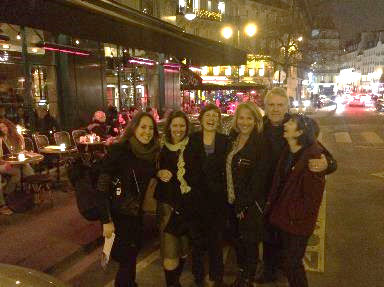
Jamie, Dawn, Shirley, Shawn, Tom and Jane
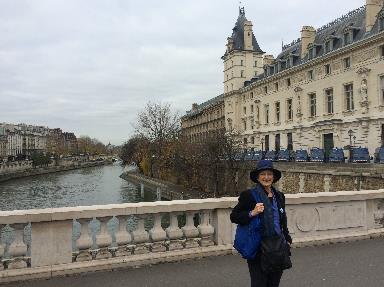
Shirley at Le Pont Neuve
Finally, many smell money in mitigating climate change – even the fossil fuel companies. For a good laugh, check out this classic short film from Shell: https://www.youtube.com/watch?v=C6L2WA3ble8&feature=youtu.be .
Tomorrow, we are at Paris City Hall for an all-day Compact of Mayors event. |

